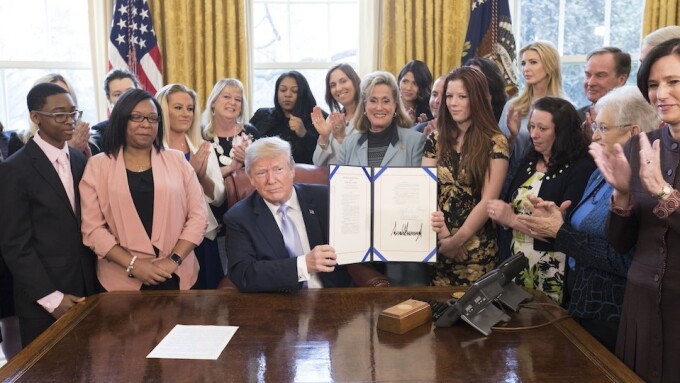WASHINGTON — Two coalitions of advocacy groups and several primarily Southern states filed three amicus briefs this past Monday, claiming that the controversial 2018 FOSTA legislation "narrowly targets the conscious facilitators of online sex trafficking” and does not threaten free speech in general.
The briefs were filed in support of the federal government’s pro-FOSTA position in the “Woodhull Freedom Foundation v. United States” case currently being heard at the U.S. Court of Appeals for the District of Columbia.
One of the pro-FOSTA coalitions has been described in reports as comprising “anti-trafficking, gender advocacy and survivor support groups,” including Equality Now, Survivors For Solutions, and Rights4Girls.
These groups argued that “any inadvertent 'chilling' effects on speech can be remedied through education regarding what the law does and does not do.” The seven groups volunteered to carry out this educational campaign.
FOSTA, which stands for Allow States and Victims to Fight Online Sex Trafficking Act, a bill introduced by far-right congresswoman and anti-choice activist Ann Wagner (Missouri, R), was signed into law by Donald Trump in April 2018, after receiving overwhelming support from both parties in both the House and the Senate.
First Amendment, electronic rights and free-speech activists have consistently opposed the legislation, which amends Section 230 of the 1996 Communications Act and allows internet service providers to be liable for the content posted on their platforms, products and sites by third-party users.
“Free speech advocates and sex worker support groups contend the law's reach is too expansive,” writes Anne Cullen on legal news site Law 360, “pointing to terms like the ‘promotion’ or ‘facilitation’ of prostitution or the ‘reckless disregard’ of conduct that ‘contributes to sex trafficking’ — and arguing that this vague wording could see outreach efforts and other legal sex-related content pulled from the web.”
Until 2018, Section 230 had been used by free-speech activists and lawyers to fend off attempts to impose Internet censorship based on content.
"The law very clearly does not affect an individual's free speech," Romina Canessa, counsel for pro-FOSTA group Equality Now, told Law360. "I think many of the concerns we have heard are an individual's own right to post advertisements for themselves, which, as far as we can tell, will not be affected."
Three more pro-FOSTA groups, the National Coalition Against Domestic Violence, gender advocacy group Legal Momentum and anti-sex-worker organization Florida Abolitionist also filed an amicus brief, arguing that first-amendment considerations are negligible in the face of “human trafficking.”
“This law is not about speech,” those three groups argued in the brief. “It is about ensuring that those who choose to aid illegal conduct can be held responsible by those they have harmed.”
"We filed this brief to give a voice to the thousands of victims of online sex trafficking in this country, who suffered unthinkable harm prior to the enactment of FOSTA due to the ease with which people could be bought and sold over the internet," Karen A. Chesley of Boies Schiller Flexner LLP told Law360.
The third amicus brief in support of FOSTA was filed by the attorneys general of a group of primarily Southern states, including Texas, Alabama, Florida and Georgia, arguing that the law should not worry non-“human trafficking”-related advocates of protected speech.
“The congressional intent, apparent from FOSTA's language, was to target unprotected speech that promotes or facilitates the trafficking of human beings to be exploited in unlawful commercial sex trade," these mostly GOP state officials said in an amicus brief.
Strangely enough, the amicus briefs, which attempt to convince the judges and the public that FOSTA will not be used to enforce online censorship and police the sexual activities of consenting adults, diverge from the federal government’s own defense of FOSTA.
The government’s filing of its position last week did not focus on the constitutional issues arising from FOSTA's deliberately overreaching, ambiguously worded provisions, but instead challenged the legal standing of the plaintiffs to bring forth the lawsuit.
Back in June 2018, digital-rights nonprofit the Electronic Frontier Foundation (EFF) and partner law firms filed a lawsuit against the Justice Department on behalf of two human rights organizations (Human Rights Watch and Woodhull Freedom Foundation), a digital library, an activist for sex workers and a certified massage therapist, to block enforcement of FOSTA.
The case, known as “Woodhull Freedom Foundation v. United States,” was dismissed by a federal court last September without arguing the constitutional issues. The lower court found that none of the plaintiffs had standing to challenge the law.
The plaintiffs appealed the case and it is currently being heard by a three-judge panel in the U.S. Court of Appeals for the District of Columbia.
For XBIZ's ongoing coverage of FOSTA-SESTA, click here.






